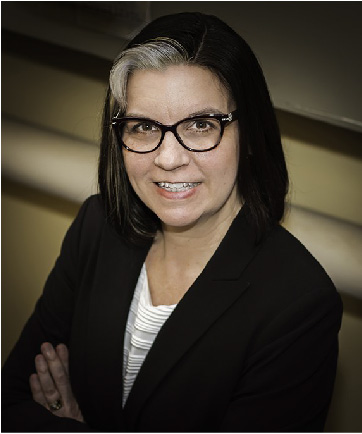
Jennifer Kruschwitz
In this installment of Senior Member Insights, we talk with Jennifer Kruschwitz. Jennifer has been an optical-interference-coating designer for nearly 30 years, working in optical coatings before leaving industry in 1998 to start her own consulting company, JK Consulting. Since 2015, she has been an assistant professor at the University of Rochester’s Institute of Optics. She has served as president of the Rochester Local Section of OSA and on the OSA Board of Directors. In 2012, Jennifer was named Digital Rochester’s Technology Woman of the Year for her contributions to optics and for helping women in her field.
What first interested you in pursuing science?
I had always loved science throughout my childhood. I felt confident in the laboratory and enjoyed learning about what makes our world work. This confidence and curiosity made science a perfect discipline for me to pursue.
Describe a major turning point in your career. Was there a specific action/accomplishment that got you there?
Leaving industry to become a consultant in 1998! I had just left an unfulfilling job, I was a young mother, and I needed to have more flexibility in my work schedule. When one of my customers from an earlier job found out that I was a free agent, they hired me for my first consulting gig. That is when I realized that others valued my skills in optical-interference-coating design.
Have you encountered a period where you have been discouraged in your pursuit of science? If so, how did you persevere?
I have had many pity-parties for myself over the decades, when I had put all of my energies into grant proposals that never panned out; or when my children were little, my house was a mess, and my family seemed to be in some perpetual state of sickness, I was ready to give up my consulting business.
I persevered by giving myself time: time to sleep, time to read, and time to breathe. When I focused on what I needed to get through a crisis, I was always better prepared to help my family through. Then before you knew it, another client would call with an exciting design job, and the kids would be healthy again. (My house would still be messy, but I would come to terms with that.)
Of the conferences you’ve attended, has there been a stand-out topic/session/interaction that really stuck with you or changed your perspective?
I do remember evening brainstorming sessions discussing future conference topics, or industry needs with like-minds in optical thin films at OSA Annual Meetings, before the meeting became FiO. It was a fabulous way to have a voice in a discussion and meet some of the premiere scientists and engineers in my field.
What tips for successful networking do you have for early-career professionals?
Become a volunteer for a professional organization or society. This was pivotal for me in meeting people that understood my discipline.
Ask honest questions to everyone you meet, and make them feel important.
Give them a positive reason to remember you. Dr. Maya Angelou said it best, “… people will forget what you said, they will forget what you did, but they will never forget how you made them feel.”
What tips do you have for effective collaboration in your field?
Remember, you are not always going to agree with another’s work ethic, ideas, perspective, etc. But I have found that if you are honestly excited about working with others, and you let them know what you value about their contributions and how you can be an asset for their projects, collaborations tend to work more smoothly.
What have you learned by being a mentor to others, and what have you learned from mentors who helped shepherd your career?
In either case when I was a mentor or I had a mentor, I learned that I wasn’t alone in my struggles. That was incredibly comforting to me. Everybody has something that they need help with … everybody.
How do you define success in your career?
Success is knowing that your contributions have value and make things better. Celebrate the small successes as well as the big ones.
How important are leadership roles in career development and how do you hone your leadership skills?
Being a leader doesn’t mean you have to find a job in management. If you wish to remain a scientist or engineer, be someone who is at the top in your field. Becoming a leader in your field takes time and effort. One suggestion that I can give to becoming a leader in your field is take on projects that challenge your abilities. When you make mistakes (and you will), you will learn better approaches for the next time. Many of the most prominent scientists have made more mistakes than they would like to admit, but they kept moving forward, learning new things, and educating others on what they learned.
What advice do you have for young scientists who are about to interview for their first job?
Smile! Let the interviewer know you are happy to meet them. Speak clearly, confidently, and honestly. Do your homework and learn about the company, and if you can, about the person or people who might be interviewing you. This way, you can ask informed questions about them and their company.
At this point in your career, what are you most looking forward to next?
I am looking forward to teaching the next generation of optics students, and writing my second book. (First book should be on the shelves in late 2018!)
If you weren’t in the sciences, what would be your dream career?
I would be a fashion designer. My company would make all of their own fabrics. I love the visualization, design and construction of a garment. I also love patterns, textures and color.
